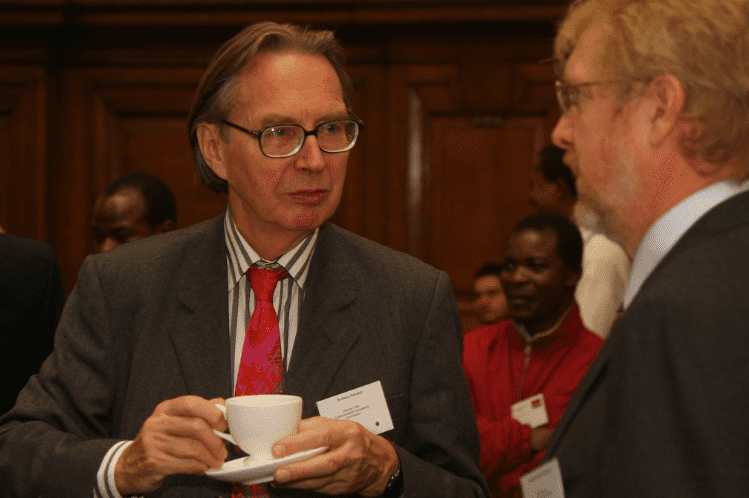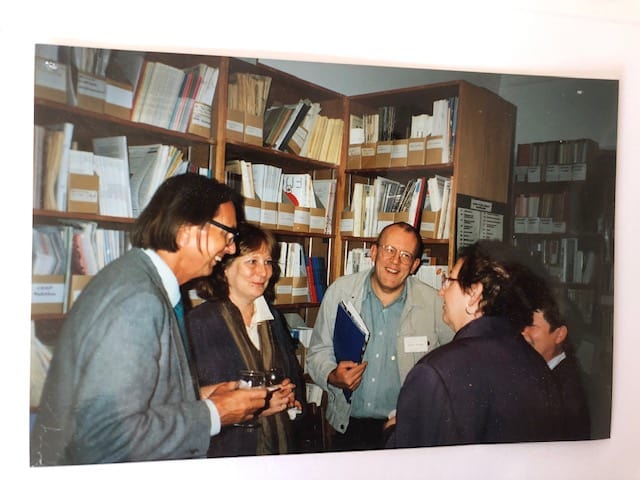Call free on: 0800 389 2839
Call free on: 0800 389 2839
Join in... The latest news and blogs from NEC
Tribute to Hilary Perraton Wednesday, 16 February 2022

Hilary Perraton, one of the first members of staff of the National Extension College (NEC), sadly died of cancer on 15th November 2021. (Obituary in Guardian https://www.theguardian.com/education/2021/dec/27/hilary-perraton-obituary)
During his life he made a significant contribution to shaping the discipline of open and distance learning as a thinker, writer, researcher and teacher and laid the foundations for promoting flexibility in education as a key to widening access and to development. The rethinking involved moving from the model of the institution at the centre to putting the student in the centre and paved the way for the establishment of the UK Open University and many other open schools, colleges and universities across the world.
NEC was founded by Michael Young (Lord Young of Dartington) and Brian Jackson in 1963 to do something practical about the stark inequalities of opportunity after the second world war where many people had their lives and education disrupted. They were interested in using open and distance learning to reach people that the formal education system could not.
Announcing the establishment of NEC , Michael said: “Ours will be the invisible college of Cambridge – who are to be the students? – They will be those people who need a second chance- those who did not have the education they would like when they were younger and are not getting it now”
The founders of NEC had a significant challenges to overcome, firstly to counteract the poor reputation of the existing correspondence provision and secondly to build a new and innovative model for distance learning which used a wide range of media including broadcasting and science practical kits and carefully designed course materials which were engaging and built on the life experiences of the learners.
“Hilary as the education director was a key player in this as well as building the administrative infrastructure which was essential to the success of the College.”
Once NEC was up and running, the model was of great interest to developing countries needing to expand their own educational provision with scarce resources. This interest led to Hilary and Michael Young setting up the International Extension College (IEC) in 1971 to provide consultancy and support for these countries and to support pilot programmes. He was seconded from IEC to help establish the Botswana Extension College which eventually became the Open University of Botswana.
Hilary left IEC at the end of 1983 to take up a post in adult and non-formal education at the Commonwealth Secretariat. Drawing on his extensive range of contacts across the Commonwealth he was the chief architect with Lord Asa Briggs in the conceptualisation and creation of the Commonwealth of Learning [COL] devoted to promoting the use of distance learning for socio-economic development and for social justice: https://www.col.org/news/tribute-to-hilary-perraton/

On retirement from the Commonwealth Secretariat, Hilary spent 18 months at the University of the West Indies helping to develop their distance learning programmes. When he returned to Cambridge he founded and became the first director of the International Research Foundation for Open Learning, a specialist research agency, with charitable status, whose purpose was to support and carry out research on open and distance learning. Its particular concerns were with education in developing countries and the development of policy for open and distance learning. After retiring as its director he became a research associate of the von Hügel Institute of St Edmund’s College, Cambridge, in order to continue research in education.
Hilary maintained his relationship with NEC, by serving on its Board of Trustees, where his sound advice helped the Board and the staff to plan NEC’s programmes.
He leaves a legacy of excellent research through his publications on open and distance learning and international education. Titles include Alternative routes to formal education (ed.) (Johns Hopkins University Press 1982), Distance education for teacher training (ed.) (Routledge 1993), Open and distance learning in the developing world (Routledge 2000, second edition 2007) and Learning Abroad: A history of the Commonwealth Scholarship and Fellowship Plan (Cambridge scholars Publishing 2009).
But perhaps his biggest legacy is the wise and practical support he has given to all the organisations he contributed to and NEC owes him a big debt of gratitude.
This post was written by NEC Trustee, Dr Ros Morpeth OBE.
Leave a Reply Cancel reply
More stories
working at NEC
Uncategorized
- Balancing an A level with My Passion for Dance
- The Future of Art History: Why Study A level History of Art with the National Extension College?
- Why Study Physics?
- Embracing a New Path: Jill’s Journey from Online Learning to Career Success in Art History
- How Toby Found a Perfect Fit for His Passion: Online A level English Literature with NEC
Study Tips
Student Stories
- Balancing an A level with My Passion for Dance
- Passion and Academics: How Izzy Balances Full-time Musical Theatre Studies with Studying A level Physics
- How NEC Helped Kari’s Son Niko to Continue his A level Studies Despite Long-Term Illness
- Embracing a New Path: Jill’s Journey from Online Learning to Career Success in Art History
- How Toby Found a Perfect Fit for His Passion: Online A level English Literature with NEC
SFT
Results Day
- Resitting A level STEM Subjects: How to Turn Your Setback into a Stepping Stone for a Brighter Future
- Resits vs. Retakes: Understanding the Difference and Making the Most of Your Second Chance
- GCSE Results Day 2024: What to Do When You Didn’t Get the GCSE Results You Wanted
- GCSE Results Day 2024: Your Complete Guide
- A level Results Day 2024: Your Ultimate Guide to Success
Policy and Campaigns
- A Pathway to Success Beyond A levels: Why Level 4 and Level 5 Qualifications Matter
- Schools and Academies Show 2024: Insights for School Leaders
- Big Data and Educational Trends: Insights for Students and Schools
- University of Cambridge Institute of Continuing Education offers tuition fee bursary for NEC A level students
- Five study bursaries for state sector teachers to take online A level Classical Civilisation offered by The Classical Association
Podcast
Our Courses
- Balancing an A level with My Passion for Dance
- How NEC’s Inclusive Approach to Learning Design is Redefining Independent Learning
- NEC’s Learning Design: A Pathway to Success for Independent Learners
- Passion and Academics: How Izzy Balances Full-time Musical Theatre Studies with Studying A level Physics
- Why Study Psychology? – Key Benefits, Careers and What You’ll Need to Study Psychology at University
Lifelong Learning
- A Pathway to Success Beyond A levels: Why Level 4 and Level 5 Qualifications Matter
- Benefits of Homeschooling: Is Home Education Right for Your Family?
- How NEC’s Inclusive Approach to Learning Design is Redefining Independent Learning
- The Future of Art History: Why Study A level History of Art with the National Extension College?
- National Coding Week 2024: The Vital Role of Coding in the Modern World
Home Schooling
- Benefits of Homeschooling: Is Home Education Right for Your Family?
- How NEC Helped Kari’s Son Niko to Continue his A level Studies Despite Long-Term Illness
- Exploring Science Practicals at Home: A Guide for Homeschoolers
- Homeschooling in 2024: How to Personalise Your Child’s Education
- What is Homeschooling?
Guest Blogs
- Passion and Academics: How Izzy Balances Full-time Musical Theatre Studies with Studying A level Physics
- My Experience as a Marketing Intern with the National Extension College
- The economics of political parties
- Embarking on a journey: My decision to ‘Fast-Track’ A level Physics with NEC
- Homeschooler Andrew’s experience of studying IGCSE Chemistry
General
- Balancing an A level with My Passion for Dance
- A Pathway to Success Beyond A levels: Why Level 4 and Level 5 Qualifications Matter
- Schools and Academies Show 2024: Insights for School Leaders
- How NEC’s Inclusive Approach to Learning Design is Redefining Independent Learning
- NEC’s Learning Design: A Pathway to Success for Independent Learners

Add a new comment
Current comments: 0